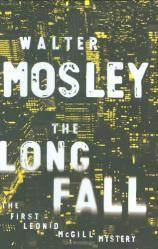The Long Fall: The First Leonid Mcgill Mystery
Review
The Long Fall: The First Leonid Mcgill Mystery
Walter Mosley took the mystery genre by storm in 1990 when he
introduced a mystery series set in post-World War II Los Angeles
starring a black detective named Easy Rawlins. Here was a detective
who worked in the same town as Raymond Chandler’s Marlowe but
walked on far different mean streets. It was a significant
breakthrough in the world of mystery writing.
There have been nine Rawlins novels since then, and Mosley has
gone on to write everything from serious fiction to science fiction
to politics to even a book on how to write books. He is one of our
most prolific authors. But he has never written a contemporary
mystery. And he has never attempted, in his own words, “a
classic noire suspense story.”
Until now THE LONG FALL is a new private eye series set in
contemporary New York City. Mosley expects to write a total of 10
books following the adventures of private eye Leonid McGill. And
longtime fans of both Mosley and mysteries will not be
disappointed. This is an important and exciting arrival in the book
world, perhaps every bit as significant as the start of the
Easy Rawlins series.
Mosley reinvents the PI genre in THE LONG FALL. McGill has
little in common with great PIs of the past. Unlike Hammett’s
Spade and Chandler’s Marlowe, McGill is not the type to sit
around his office, waiting for the femme fatale to come through the
door with her mysterious problem. Nor is he a knight errant like
Robert B. Parker’s Spenser.
McGill is dirty, plain and simple. He has made his living as a
fixer for the mob and others. He does “piecework for killers
and thieves.” If you want a politician caught in a hotel room
with a $2,000-a-night hooker, McGill is your guy. He tells us early
on: “I had no problem bringing people down, even framing them
with false evidence if that was what the client paid for. I
didn’t mind sending innocent men and women to prison because
I didn’t believe in innocent --- and virtue didn’t pay
the bills.” Here is a man existentially ready for the
fall.
McGill is not a killer, at least not a triggerman. He worked on
the edges of the law, often resorting to barter that was little
more than extortion/blackmail. So, for example, he is able to rent
his office in an Art Deco midtown skyscraper for $1,800 a month
when the market value of the space is $11,000 a month. McGill knows
how to trade.
But at 53, his past has finally caught up with him, leaving him
trapped in what he calls an “impossible life.” He has
“decided to go from crooked to slightly bent” and has
managed to stay straight for a year and a half. His personal life
is a disaster. He has not loved his wife for a dozen years. She ran
off with another guy, and then when that imploded, she came back to
him. He is father to three kids, two of them not his own. And one,
his 16-year-old stepson, is heading right off the deep end and is
about to become a criminal himself, unless McGill can save him.
McGill is a black man in a world where, as he points out,
“It wasn’t 2008 everywhere in America.” The
America of 2008 might have elected an African American president,
but the past is never past, as Faulkner supposedly said. Mosley has
always been a writer with a voice and social consciousness. And he
has not lost it here. For example, he writes, “The scenario
is simple, it just didn’t make sense; like a cat sealed in a
glass globe or the United States declaring peace.”
McGill is a man haunted by his past, and he soon learns what Al
Pacino’s character learned in The Godfather: Part
III: it is not so easy leaving the life. At one point he meets
with a 70-year-old mobster to tell him he is out. Mosley writes,
“The fit septuagenarian allowed another hint of mirth to flit
across his lips. No one gets out, his smile said,
unless it is on his back.”
So McGill takes a job that smells bad to him from the start. An
Albany PI pays him $12,000 for the whereabouts of four young black
men. It is simple trafficking in information, something he has done
a thousand times before. So despite his misgivings, he takes the
money. McGill says, “And, anyway, I was broke and the rent
was due.”
In that sentence, Mosley creates a PI for our time, capturing
perfectly the financial moral relativism of the past 30 years that
has brought our entire economic system to the brink of the abyss.
People are soon dying as a result of McGill’s betrayal, and
McGill might join them. And even if a killer does not get him, the
aging private eye is getting himself. He says, “…I had
the sensation of slipping further down into the sandpit of my own
sins.”
Mosley has written a true noir novel here. Take this passage for
instance: “One thing I had learned in fifty-three hard years
of living is that there’s a different kind of death waiting
for each and every one of us --- each and every day of our lives.
There’s drunk drivers behind the wheels of cars, subways,
trains, planes, and boats; there’s banana peels, diseases and
the cockeyed medicines that supposedly cure them; you got airborne
viruses, indestructible microbes in the food you eat, jealous
husbands and wives, and just plain bad luck.”
Mosley has also given us a character who, despite his dark past,
has a basically good heart and is decent enough to seek redemption.
We can’t help but root for Leonid McGill, which will make
this an interesting series to watch develop over the next decade.
Will McGill find his redemption, or is it too late for a character
so bad?
THE LONG FALL title is a deliberate echo of the past and
Chandler’s THE LONG GOODBYE. But Walter Mosley is too great a
writer to just recycle the classic PI novel. This is a PI novel for
the early 21st century, and the title refers not just to the fate
of one man but perhaps an entire nation as well.
Reviewed by Tom Callahan on December 30, 2010





